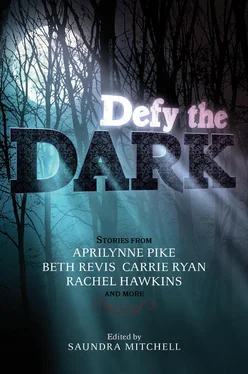Out of the corner of his eye, he watched the dead woman prop herself against the lamppost, giggling facelessly.
The phone cracked in his fist; otherwise Cado didn’t react. If he ignored the dead woman, surely she would remember she was supposed to be dead and shut up.
A thick tearing split the air. Like whatever had stolen the dead woman’s face had decided to rip it in half. Only nothing so small as a face—this was vast. Mountainous. The sound of the world clawing itself open so violently, the force of it snuffed out the scant halos of light beneath the lampposts.
The cathedral bells chimed but distantly, as if they were miles away instead of down the street. On the third chime, the trolley appeared.
Cado squinted against the sudden light it brought. The single burning headlight and the interior lights all cast a feverish glow. Even the trolley itself was the yellow of something spit up from a diseased lung.
The doors accordioned open when Cado stood. For several moments his legs refused to move forward, but once he took the first step, it became easier.
Cado noticed an animal stink as soon as he boarded, like the inside of an iguana cage. The odor emanated from the motorman crammed into the driver’s seat, too tall for the space if the awkward jut of his knees was any indication. The motorman had no eyelashes, and his lids made a gummy smack when he blinked.
“One dollar.” It was the same sexless voice Cado had heard earlier, but it didn’t belong to the motorman. It came from a speaker on the control panel. A recording.
Cado put two Sacagawea coins into the cash box. “I told you,” he said, proud that he no longer sounded like a girl. “Round trip.”
He turned to take a seat, and a sharp pain stabbed through the base of his skull just before the doors banged shut.
Cado grabbed the back of his head and whipped around in time to see a stinger retreat into the motorman’s palm as he grabbed the lever and set the trolley in motion.
“What did you do to me?”
The motorman punched a button on the control panel, and the voice hissed once again from the speaker. “Sit.”
Cado realized, just as he had with the cackler, that he was in the presence of something inhuman. Not just smelly and misshapen, but inhuman. Something he might have been tempted on any other day to stomp beneath his shoe, but today he did as he was told. He went to the back of the trolley and sat on the hard wooden seat. The sting hadn’t hurt him; it simply made everything floaty and pleasant.
Above the windows but below the arched roof were old-timey ads for stuff like Dictaphones and athletic trusses and nerve food, whatever that was. The ad didn’t show what nerve food looked like, only a woman holding her head in agony, and a bunch of words he wasn’t close enough to read. He wondered if nerve food was good for what ailed him.
Cado touched the sore spot on the back of his head, and his finger came away bloody. The motorman had stabbed him in the brain or maybe the spinal cord. Both? Either way, Cado should have been dead. Or paralyzed. Or at least worried. But the only thing he felt was the trolley propelling him through town. And then out of town.
Cado no longer recognized the landscape. East Texas was thick with piney forest, but the passing trees were massive, big enough to tunnel through, which the trolley frequently did. After a few moments, it began a steep ascent, and the giant trees fell away as a city rose before him.
It was what Cado imagined New York City must be like, only with buildings so tall they were wreathed in clouds. The tracks twined about the mile-high, artfully sculpted towers like ribbon unspooling from a beautifully wrapped gift.
At the height of the track, the trolley paused and Cado’s window aligned with the top window of one of the skyscrapers. A woman sat inside at a vanity applying mascara to the third eye in her forehead. That third eye winked at Cado just before the trolley plunged into freefall. Into darkness.
The track leveled off seconds later, and after Cado’s stomach had settled back into place, he realized the trolley lights had shorted out, maybe damaged by the rapid descent. Outside, however, glowing pink corkscrews of light spiraled down in the dark like fancy New Year’s Eve confetti.
After a few moments, it began to get lighter inside the trolley, not the same feverlight as before, but bluish and intense. Cado could see again, the motorman hunched at the front, the hand straps hanging like nooses, the ads. The nerve-food woman was still holding her head, but now she was laughing. Even though her body was peppered with almost comically large bite marks.
Cado tittered nervously and turned away, but the strange light had destroyed the exterior view. He could only see his own reflection, half asleep like a boy daydreaming in class. Or nightmaring. Waiting for a rap on the knuckles to snap him out of it. But there was only the motorman who had stabbed his brain and robbed him of his fear, which was fortunate because Cado realized he could see inside his own head.
The blue light shone through him like radiation, his brain barely visible, obscured by a thick whitish soup. Like whatever the motorman had shot into his head had turned it into a giant zit. Without thinking, Cado put his hands over his ears and squeezed. Patricia would have done it if he had allowed her to come. He could no longer remember why he’d been so against it.
Fluid gushed out of the hole at the base of his skull and splatted against the back window. He could see his brain now, clean and clear. Everything was clear. And so bright. Not just in the trolley. He could see past his own reflection to a moon as big as the Himalayas crowding the horizon so closely, Cado could see its pockmarked texture. The light it cast fell on him like a weight and killed even the possibility of shadows.
The gleaming stretch of track skated over swirls of rock, valleys of ice, but his view of the terrain was eclipsed by a horde of creatures that mobbed the trolley, scuttling alongside like fans chasing a pop star’s limo. But these fans, like the motorman, weren’t human.
The creatures were small. Half Cado’s size. Children, really, from the waist up, but from the waist down they had too many legs. Too many to count. So many they were able to easily keep up with the trolley, which had begun to slow down.
They peered at Cado, their gummy eyelids smack-smack-smacking at him. Interested in him. Waiting for him.
After the trolley came to a complete stop, the motorman unfolded from his seat and faced Cado. The sick moonlight shone through him, revealing an unfamiliar grouping of organs, a swish of pale blood, and the motorman’s legs—his real ones—unfurling wetly up the walls to make room.
Cado, without realizing it, had begun whistling “Tango Etude No. 5” to give himself something nice to listen to instead of the motorman’s scabrous approach. He wished the poison in his head was back. There had been no room for fear then—now fear was the only thing he had. That and his flute case.
He reached for it, careful not to look down and see his own quivering guts, his frozen blood. He still couldn’t feel his fingers, but he saw them snatching open the latches, saw through them without meaning to, his own blood not frozen but red and frantic when he grabbed the hunting knife from the case, the one he’d killed the cackler with. It was a foot long at least, bone handled, and sharp enough to decapitate a wild hog.
Cado’s arm whipped at the motorman, at those endless legs, at the chest, at the face with its gummy eyes shocked to see prey fighting back. Cado let his seemingly demonic arm do all the work as the rest of him screamed while blood splashed over the trolley walls like water.
Читать дальше












